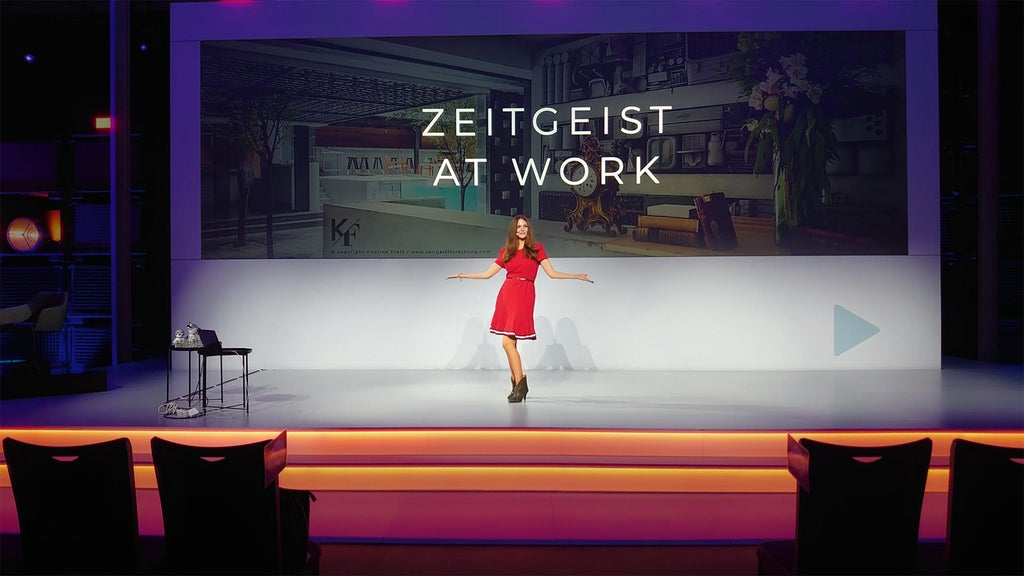“Zeitgeist is a crack in the matrix”
missing translation: fa.article-intro.reading-time – Copy: Nadia Riaz-Ahmed - Photo: privat, Zveistudios, Unsplash – 05/08/2023

Kirstine Fratz is one of the best-known zeitgeist experts in Germany. As an international keynote speaker, she be seen on stage talking about zeitgeist dynamics in all aspects of life.
Kirstine Fratz is one of the best-known zeitgeist experts in Germany. As an international keynote speaker, she be seen on stage talking about zeitgeist dynamics in all aspects of life.
Ms Fratz, what does zeitgeist actually mean?
I have developed the following definition during my research: zeitgeist is a temporary promise for a successful life. It whispers to us as human beings again and again: "There is more to it, it can be done differently". Zeitgeist shows us what our lives could actually look like and steers our society in new directions. Directions that were not planned and were not previously imaginable. Without zeitgeist - if, for example, we clung to a very specific cultural form - we would not get any new perspectives.
Until a few years ago, the term was not too familiar. Is it a new phenomenon, a buzz word even?
Zeitgeist has taken on a new interest and resonance because of the many major and minor crises in recent years. More and more people are considering what is the larger principle behind our social change and what really drives cultural evolution. I originally come from trend research and even back then I sensed that one day it will certainly no longer be enough for us to simply chase after trends.
What is the difference between trend and zeitgeist?
Trends are the children of zeitgeist. Zeitgeist offers a new version of the ideal life and communicates it to us, sometimes loudly, sometimes quietly. These messages then take root in society and appear in the form of many small trends in various aspects of life - be it in nutrition, lifestyle, work, or health. This can be a new flavor of chocolate or even kindergartens changing their name from "Little Rascals" to "The Academy", for example. In contrast to trends, zeitgeist gives us access to the cultural subconscious and forms the basis for cultural evolution.
“Zeitgeist always becomes visible when our familiar social ideas stop working.
Kirstine Fratz
How do you manage to stay on the trail of social change?
Zeitgeist research has a lot to do with perception in the present. Zeitgeist always becomes visible when our familiar social ideas stop working. I call this the crack in the matrix. That's the moment when someone realizes, "Here comes a new conception of life." That is, when more and more people feel a cultural awakening. I'm always on the lookout for these cracks. Then I look to see what transformation is emerging from there.
Do you have an example?
At the moment, I am increasingly noticing that the human-centric approach is replacing linear profit thinking in companies. People no longer consider themselves fit for the future if they don't put people at the center of their considerations. This is an enormous change. There's a lot of zeitgeist work in the transition from linear profit thinking to "We're putting people and the environment more and more at the center of economic activity." I'm not saying it's all working beautifully already, but the thinking, the expectation, and the pressure to do it is there and that's zeitgeist at work.
Audi x Bits & Pretzels Festival
But how can a company tap into the potential of zeitgeist?
For companies, it is always a challenge. Because a functioning structure already exists and inviting the new to join it involves potential but of course also risks. Those who can help here are so-called spirit makers. They exist in every company. They are people with a special mindset who recognize the cracks in the matrix and have exciting ideas about how to apply them in the company. Companies need to engage in a stronger discourse with these employees and actually promote cultural evolution. This is much more sustainable and holds more promise for meaning and happiness than simply adapting to trends.
What does zeitgeist mean for progressive thinking?
Everything. Zeitgeist inspires progressive thinking. Zeitgeist creates the perspective to shape progressive feelings. Zeitgeist also provides the impetus to bring progressive thinking to fruition.
To what extent does zeitgeist influence the transformation of mobility?
With regard to people's aspirations. In the future, the range of mobility options will be significantly more differentiated. In my opinion, electromobility is an innovative experiment, but certainly not the end point. It's important to keep at it and continue to think about the approach. It strikes me that our society is asking for a lot of assistance in mobility. And mobility already takes care of us more than we take care of it - and that's where we need to start. Factors like artificial intelligence and digital networking are becoming increasingly important. Perhaps mobility will become more of a service than a product that people buy. The service approach to people and the environment in mobility will, in my opinion, still produce amazing innovations.
“Promoting cultural evolution is more sustainable than merely adapting to trends.
Kirstine Fratz

"Our culture turns with the next yearning" is one of the guiding principles in Kirstine Fratz's international talks.

For the 49-year-old, zeitgeist is not a whimsical manifestation of trends, but the most powerful and creative force in our culture.
"Our culture turns with the next yearning" is one of the guiding principles in Kirstine Fratz's international talks.
For the 49-year-old, zeitgeist is not a whimsical manifestation of trends, but the most powerful and creative force in our culture.


